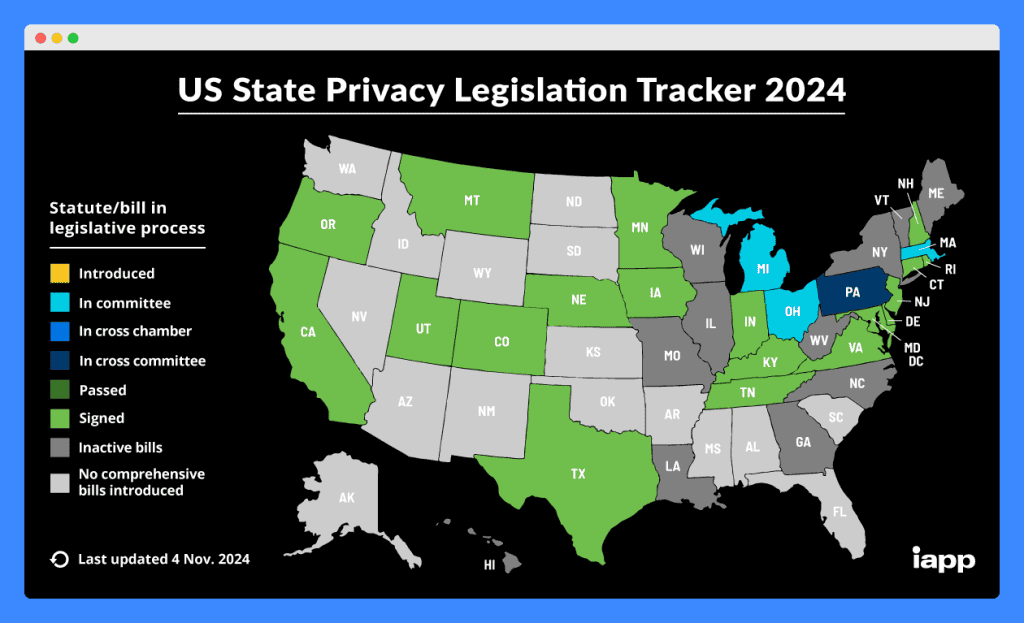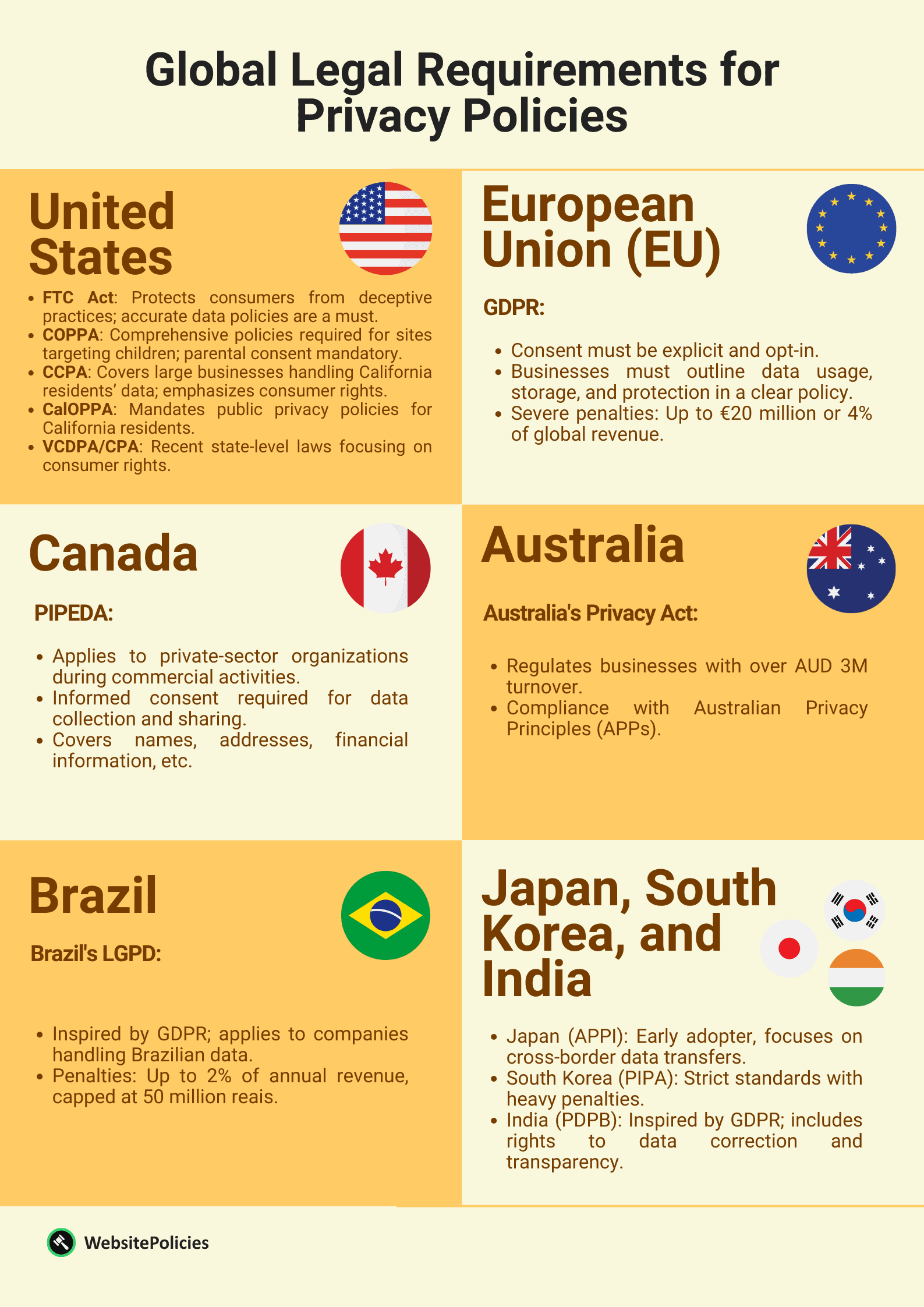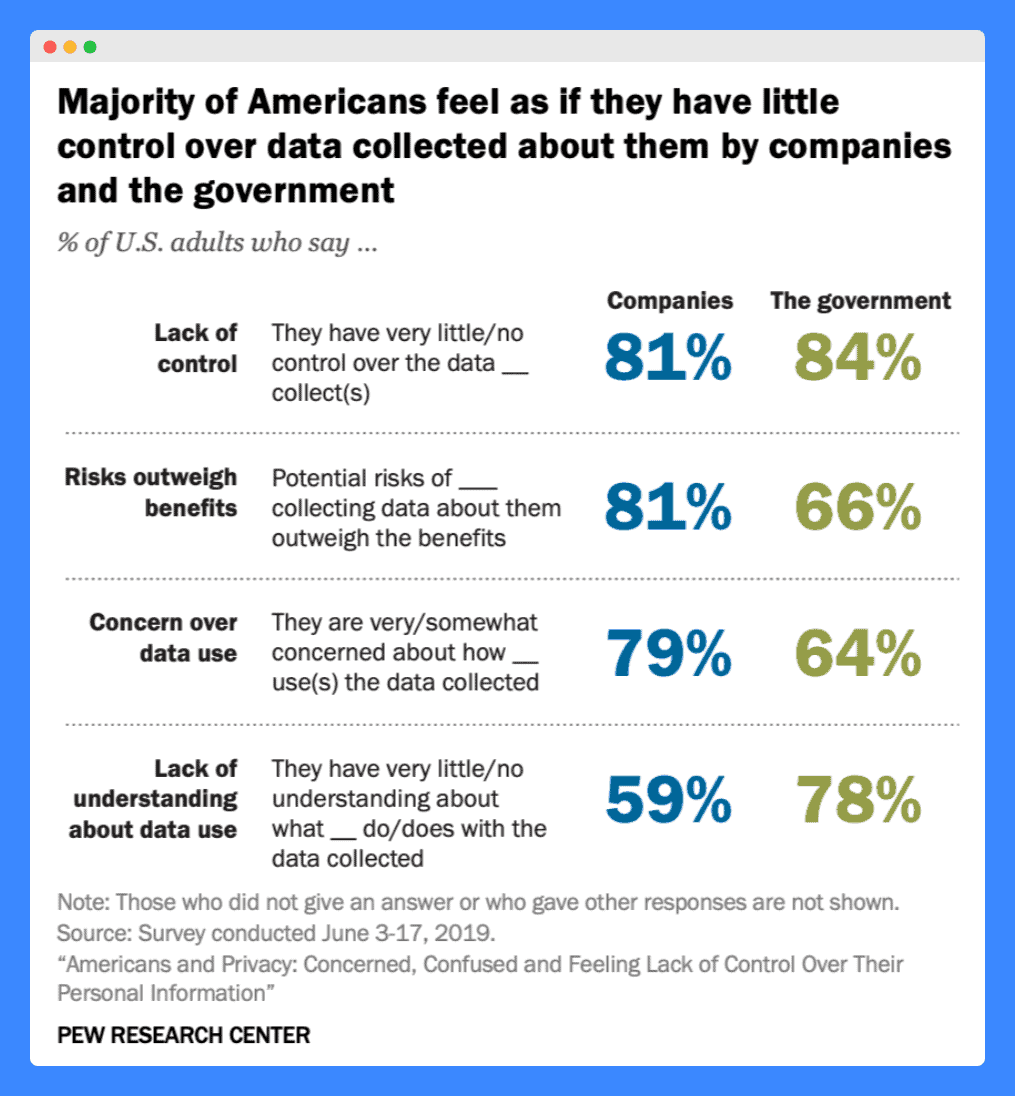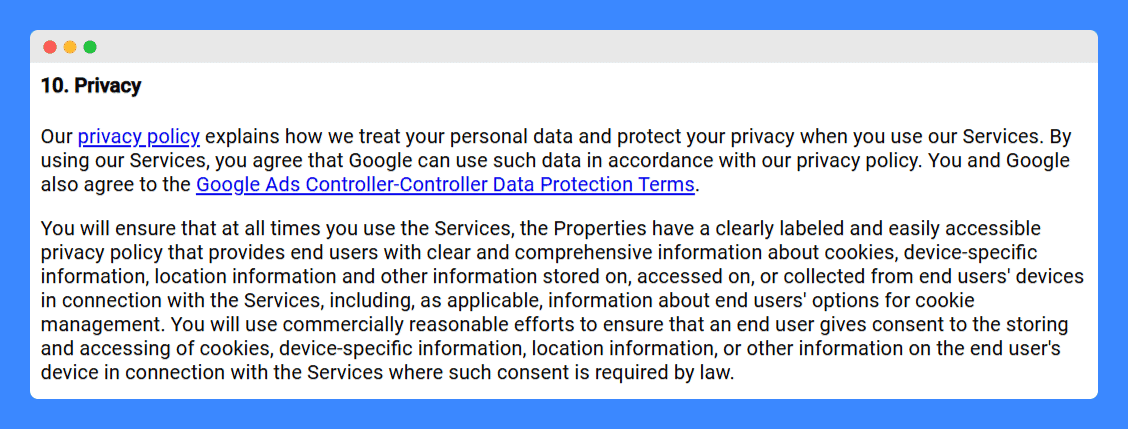A privacy policy might seem like a formality, a legal document many of us scroll through without a second glance. However, it’s a binding legal requirement that can have serious implications.
If you run a website, or an App, or collect data in any way, skipping a privacy policy isn’t a good start for your business. Without one, you’re not only taking a major risk but could be breaking the law.
With privacy regulations becoming more complex worldwide, non-compliance can result in serious fines, not to mention damaged trust with your users.
So, are privacy policies legally required? And if so, what does that mean for businesses, big or small? Below, I’ll get into all the necessary details as to why privacy policies matter, why you need them, and how they protect both your businesses and users alike.
- Privacy policies are legally required in most regions for businesses that collect personal data, with expanding global regulations such as GDPR, CCPA, and others.
- Non-compliance with privacy laws can lead to significant financial penalties, legal actions, and loss of customer trust.
- Regularly updating a privacy policy ensures compliance with evolving data privacy laws and strengthens customer trust in a company’s data practices.
Table of Contents
PRO TIP: Take the hassle of writing your own privacy policy away with our privacy policy generator trusted by over 200,000 businesses. It’ll save you hours of work and possible costly legal mistakes.
Is a Privacy Policy Legally Required?
Yes, in many cases, a privacy policy is legally required. Depending on where your business operates and whom you serve, privacy laws mandate that businesses collecting personal information disclose how they use, store, and protect that data.
Globally, privacy regulations are expanding. UN Trade and Development (UNCTAD) reveals that 137 out of 194 countries now have some form of data protection legislation in place.
In the United States alone, several states have enacted comprehensive consumer privacy laws similar to the California Consumer Privacy Act (CCPA).
However, many more states are actively considering privacy bills, as seen in the 2024 U.S. State Privacy Legislation Tracker by the International Association of Privacy Professionals (IAPP):

As data collection continues to expand, so does the legislative focus on privacy, with states across the country increasingly moving toward stronger protections for consumer data.
Having a good privacy policy is more than just a box to check, you must have a privacy policy to ensure legal compliance and foster trust with your users.
When Are Privacy Policies Legally Required?
Privacy policies are required by law when a business collects personal information from users in regions with privacy regulations.
For example, if a website or app gathers personal data—such as names, email addresses, or IP addresses—from users in the European Union, it must comply with the General Data Protection Regulation (GDPR), which mandates a clear and accessible privacy policy.
Similarly, in the U.S., CCPA requires businesses that meet certain thresholds to provide a privacy policy on their website detailing their data practices.
Beyond these, privacy laws are spreading globally, with countries like Brazil, Japan, Australia, and Canada introducing their own regulations.
Here’s a quick overview of common triggers that make privacy policies legally required:
- Location of Users: Serving customers in the EU (GDPR), California (CCPA), or other regions with privacy laws.
- Data Type and Scope: Collecting personal information, from emails to payment details.
- Revenue and Scale: Larger businesses, especially those profiting from data, often have stricter requirements.
Keeping up with these regulations not only helps you avoid legal trouble but also reassures users that their data is handled responsibly
In my experience, users are more likely to trust a business that openly communicates its privacy practices, which is why I recommend that companies regularly revisit their policies for accuracy and clarity.
Legal Requirements For Privacy Policies Worldwide
With data privacy concerns on the rise, many countries are enacting strict laws to protect personal information. Privacy policies are now legally required in most parts of the world, with regulations evolving rapidly to keep up with the growth of digital business.
From the United States to the European Union, privacy laws like the GDPR and CCPA set high standards for transparency and data protection.
These regulations require businesses to clearly communicate how they collect, use, and safeguard personal information. Each region enforces its own set of rules, and penalties for non-compliance can be substantial.
PRO TIP: Regularly monitor the privacy laws in regions where your customers are located. Privacy laws are continually evolving, and making a privacy policy that aligns with these changes ensures your business remains compliant and avoids penalties.
Below are privacy policy requirements across key regions.

1. United States
In the U.S., privacy policies are shaped by both federal and state-level regulations that impose specific requirements for transparency and consumer rights. Here’s an overview of the primary laws:
Federal Trade Commission Act (FTC Act)
The FTC Act empowers the Federal Trade Commission (FTC) to protect consumers from deceptive or unfair business practices. This means businesses need to disclose accurate information in their privacy policies about data collection, sharing, and security practices.
If a company’s privacy policy is misleading or fails to uphold promised standards, the FTC can intervene, sometimes resulting in hefty fines and mandated corrective actions.
Children’s Online Privacy Protection Act (COPPA)
Aimed at protecting children under 13, COPPA requires websites, apps, and online services that target children or knowingly collect data from minors to have a comprehensive privacy policy. This policy must detail the types of data collected, how it is used, and with whom it is shared.
COPPA also requires obtaining verified parental consent before collecting children’s data and obliges companies to keep collected data secure and accessible only to authorized personnel.
California Consumer Privacy Act (CCPA)
The CCPA is one of the broadest state-level privacy laws in the U.S., applying to companies meeting specific thresholds, such as:
- Annual revenue exceeding $25 million,
- Handling data of 50,000 or more California residents, or
- Deriving over 50% of revenue from selling consumer data.
Under CCPA, businesses must provide a privacy policy that clearly outlines what personal information is collected, how it is used, and with whom it is shared. Additionally, companies must inform users of their rights to access, delete, or opt out of the sale of their data.
PRO TIP: If your business crosses CCPA thresholds, conduct regular audits to ensure all data practices align with CCPA requirements.
California Online Privacy Protection Act (CalOPPA)
CalOPPA mandates that any website or online service collecting personal data from California residents have a conspicuously posted privacy policy.
This policy must specify what personal information is gathered, the purpose of collection, and any third parties with whom the information is shared.
Importantly, CalOPPA requires companies to update their privacy policies as practices change and to disclose how users can modify their information or opt out.
Virginia Consumer Data Protection Act (VCDPA)
Enacted in 2021, Virginia’s CDPA requires companies to disclose their data collection practices in a clear privacy policy if they process data of 100,000 Virginia residents or derive a substantial portion of revenue from the sale of personal data.
Similar to the CCPA, the VCDPA provides consumers with the right to access, delete, and opt out of data sales.
Colorado Privacy Act (CPA)
The CPA, effective in 2023, applies to companies processing data of over 100,000 consumers or generating revenue from selling data. It requires businesses to include a privacy policy that explains data collection practices and offers consumers privacy rights similar to those under the CCPA.
2. European Union
The GDPR is the European Union’s comprehensive data protection law, enacted in 2018.
This law sets one of the highest standards for data privacy laws around the world, impacting not only EU-based companies but also any organization that processes the personal data of EU residents, regardless of the business’s location.
The GDPR mandates that companies provide a clear and accessible privacy policy outlining what personal data they collect, why they collect it, and how they process and store it.
Consent must be specific, informed, and freely given, meaning users must actively opt in rather than passively accept data collection.
GDPR enforces significant penalties for violations. Companies can face fines of up to €20 million or 4% of their global annual revenue, whichever is higher, depending on the severity of the violation.
The GDPR is considered a global benchmark for data protection, and its emphasis on transparency and consumer rights has inspired similar privacy laws worldwide.
3. Canada
In Canada, the Personal Information Protection and Electronic Documents Act (PIPEDA) governs how private-sector organizations handle personal information during commercial activities.
PIPEDA applies to most businesses across Canada, with some province-specific variations, and covers all personal data that can identify an individual, such as names, addresses, and financial information.
This act requires organizations to obtain informed consent from individuals before collecting, using, or disclosing their personal information.
This means that a business’s privacy policy must clearly explain what data is collected, the purpose of collection, how the data will be used, and whether it will be shared with third parties.
While non-compliance with PIPEDA can result in penalties, current fines are relatively modest compared to the GDPR.
4. Other Notable Regions
Privacy laws are spreading globally as more countries establish robust protections for personal information. Here’s an overview of some key privacy regulations in other regions:
Australia
Australia’s Privacy Act 1988 regulates the handling of personal information by businesses, government agencies, and nonprofits with an annual turnover above AUD 3 million.
The law requires these organizations to follow the Australian Privacy Principles (APPs), which include obligations for transparency, data access, and correction rights for individuals.
Businesses must disclose their data practices through a clear privacy policy and implement adequate data protection measures. Non-compliance can lead to fines and investigations by the Office of the Australian Information Commissioner (OAIC).
Brazil
Brazil’s Lei Geral de Proteção de Dados Pessoais (LGPD) or General Data Protection Law, which took effect in 2020, is heavily inspired by the GDPR. It applies to any organization, regardless of location, that processes the personal data of Brazilian citizens.
Under LGPD, companies must have a clear privacy policy explaining what data is collected, why it’s collected, and how it’s used.
Similar to GDPR, LGPD also grants individuals the right to access, correct, and delete their data. Penalties for non-compliance include fines of up to 2% of a company’s revenue in Brazil, capped at 50 million reais per violation.
Japan
Act on the Protection of Personal Information (APPI) was one of the first data privacy laws in Asia and has been updated to align more closely with global standards.
It requires companies to disclose their data collection practices, provide data access and correction rights to individuals, and implement strict data security measures.
APPI also limits cross-border data transfers, requiring safeguards for data shared with third parties outside Japan.
South Korea
The Personal Information Protection Act (PIPA) is one of the strictest data privacy laws in Asia, setting high standards for data collection and processing.
Companies must obtain consent from individuals before collecting personal data and disclose their data handling practices through a privacy policy. PIPA imposes heavy penalties for data breaches and non-compliance, including criminal charges and substantial fines.
India
Personal Data Protection Bill (PDPB) aims to create a comprehensive data protection framework for Indian citizens.
Similar to GDPR, it requires businesses to be transparent about their data practices, provide rights to individuals, and appoint Data Protection Officers (DPOs) for compliance.
Once enacted, PDPB will apply to any organization processing data of Indian residents, regardless of where the business is located.
What Happens if You Don’t Have a Privacy Policy?
Failing to implement a privacy policy can lead to significant consequences, ranging from financial penalties to loss of customer trust. Below are some of the key risks associated with not having a legally compliant privacy policy.
Hefty Fines and Penalties
Privacy regulations like the GDPR and CCPA enforce strict fines for non-compliance.
For example, under GDPR, businesses can be fined up to €20 million or 4% of their global annual revenue, whichever is higher. In 2021, Amazon faced a record-breaking €746 million fine for alleged GDPR violations.
CCPA violations can result in penalties of up to $7,500 per intentional violation.
Legal Action and Lawsuits
Without a privacy policy, companies may be vulnerable to lawsuits from consumers or regulatory authorities. Consumers are increasingly aware of their rights, and many have taken legal action when they feel their personal data has been mishandled.
For instance, Facebook faced a $650 million class-action settlement in Illinois due to violations of biometric privacy laws.
Loss of Customer Trust
In today’s digital landscape, transparency is important for building trust.
A survey by Pew Research found that 79% of U.S. adults are concerned about how their data is used by companies.

Without a privacy policy, users may be wary of sharing their information, which can hurt customer relationships and ultimately impact revenue.
PRO TIP: Your privacy policy should be easily accessible and straightforward. Including it in the website footer or as part of the signup process reinforces your commitment to transparency.
Limited Access to Third-Party Services
Many third-party services, such as advertising platforms and payment gateways, require businesses to have a privacy policy to use their services.
For instance, Google Ads, as indicated in their terms of service, mandates that websites collecting personal information have a privacy policy in place. Without one, businesses may lose access to these valuable tools, limiting their ability to grow and engage with customers.

Increased Scrutiny from Regulators
Without a privacy policy, companies may be flagged for regulatory investigations. Organizations like the FTC in the U.S. regularly investigate businesses that lack transparency or misuse customer data, leading to public scrutiny and potential penalties.
How to Ensure Your Privacy Policy is Compliant?
Navigating the evolving landscape of data privacy laws can be challenging, but ensuring you make a privacy policy that’s legally compliant is essential. Here are steps to help you cover all bases:
Understand Key Requirements for Your Region
Begin by researching the specific privacy regulations that apply to your business based on where you operate and where your customers are located.
For example, if you serve users in the EU, you’ll need a privacy policy that is compliant with GDPR, while businesses in California are subject to CCPA. Each law has its own requirements.
Include Essential Components
A compliant privacy policy should clearly explain what personal data you collect, how it’s used, shared, and stored, as well as how users can control their data. Ensure your policy covers these critical elements:
- Types of data collected
- Purpose of data collection
- Third-party sharing practices
- Data protection measures
- User rights, like data access, correction, and deletion
- Contact information for privacy inquiries
Keep the Language Clear and Accessible
Legal jargon can make privacy policies confusing and may even lead to compliance issues. Most data protection laws emphasize transparency, so it’s best to write your privacy policy in plain, accessible language that’s easy for users to understand.
If your audience includes children or non-legal professionals, simplifying the language is especially important.
Regularly Review and Update
Privacy laws and business practices change over time, so you’ll still need to update your privacy policy regularly. For instance, if you add a new feature that collects different types of data or begin working with new third-party services, your policy should reflect these changes.
Streamline the Creation Process
Crafting a privacy policy that meets legal standards can be time-consuming and complex. Many businesses choose to streamline this process by using resources that guide them through essential components tailored to their specific needs, industry, and location.
Tools like a privacy policy generator can help you create a privacy policy that covers all legal requirements and aligns with your data practices, saving time and reducing the risk of missed compliance elements.
Frequently Asked Questions
Is a privacy policy required if my business only collects non-personal data?
If only non-personal data is collected, the law might not require privacy policies, but it’s recommended to enhance transparency.
Do third-party services I use require my business to have a privacy policy?
Yes, many third-party services, such as Google Ads, require a privacy policy on your site to ensure user data is handled responsibly.
Are privacy policies legally required for small businesses?
Yes, privacy policies are often legally required for small businesses if they collect personal data or operate in regions with strict privacy laws.
Is a privacy policy legally required for mobile apps?
Yes, mobile apps collecting personal data usually need a privacy policy in order to comply with regulations like GDPR or CCPA.
Are privacy policies legally required in all countries?
While not universally mandated, many countries enforce privacy laws requiring businesses to provide a privacy policy when collecting personal data.



